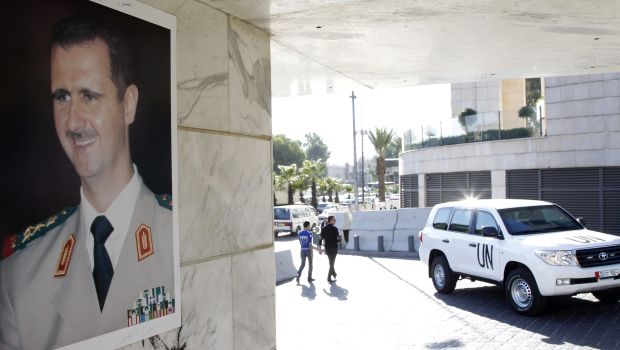
A UN vehicle is seen near a photo of Syrian President Bashar Al-Assad at the entrance of a hotel where a team of experts from the Organization for the Prohibition of Chemical Weapons (OPCW) are staying in Damascus October 8, 2013. (REUTERS/Khaled al-Hariri)
Ahmet Uzumcu, director-general of the Organization for the Prohibition of Chemical Weapons (OPCW), spoke to the group’s 41-nation Executive Council at the start of a four-day meeting in The Hague.
The organization’s inspectors are in Syria to verify and destroy the country’s estimated 1,000 tons of chemical weapons, in the midst of a two-year civil war.
Uzumcu called initial Syrian cooperation with the team last week—providing more detail of the country’s chemical weapons and beginning to destroy them and facilities to produce them—”a constructive beginning for what will nonetheless be a long and difficult process,” according to an OPCW statement.
An advance team of 35 OPCW and UN staff originally traveled to Damascus last week. Some OPCW staff have already returned to the organization’s headquarters to report on their talks with officials from President Bashar Assad’s regime in Damascus.
Uzumcu said he will soon sign an agreement between the OPCW and the United Nations to provide security and logistics to the inspection teams.
In Damascus, ruling Ba’ath party lawmaker Walid Al-Zoubi said the chemical weapons “have become a heavy burden on the state and are not a strategic defensive stock anymore” and the country is ready to dispose of them.
“Our defensive strategic reserve is much stronger than the chemicals,” Al-Zoubi told The Associated Press. “For this reason, Syria now has to get rid of this chemical inventory.”
Uzumcu did not specify how many people would be in the second team, but in a letter to the UN Security Council obtained by The Associated Press, UN Secretary-General Ban Ki-moon recommended Monday that approximately 100 UN and OPCW staff eventually make up the mission.
He said that the international community’s aim of destroying Syria’s chemical weapons program by mid-2014 will require “an operation the likes of which, quite simply, have never been tried before,” with greater operational and security risks because of the speed required.
